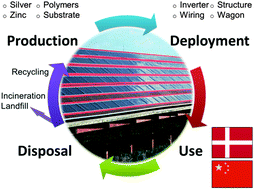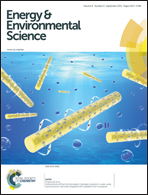Ecodesign of organic photovoltaic modules from Danish and Chinese perspectives†
Abstract
The life cycle of a solar park made using organic photovoltaic (OPV) technology is assessed here. The modules have been fabricated in a pilot scale plant and they have been installed together with other components to evaluate the balance of system, in a solar park located in Denmark. Three possible waste management practices have been contemplated for the end of life of the solar park: recycling, incineration or the average local mix. The assessment of the environmental impacts of such a system reveals that silver used in the electrodes is overall the largest source of impacts, such as chemical pollution and metal depletion. The establishment of resource recovery systems for the end-of-life management of the OPV modules is therefore crucial to reduce overall environmental impacts. Liability on the manufacturers or on the operators should be implemented. The electricity produced from OPV solar parks yields similar footprints to other traditional energy technologies; e.g. coal and natural gas. However, when the efficiency of the OPV modules is increased from 1% to 5% they are comparable to other mature PV technologies already on the market. The effects of outsourcing or exporting the production of the OPV modules from Denmark to China have additionally been studied to determine the most advantageous configuration. The stakeholders should aim at anchoring the manufacturing of solar parks in countries with stringent emission standards and/or high technology efficiencies, e.g. Denmark, and at deploying them in countries with high solar radiation to maximise the environmental benefits of the PV technology.


 Please wait while we load your content...
Please wait while we load your content...